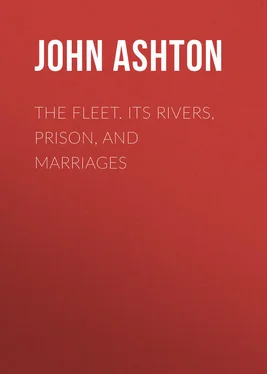John Ashton - The Fleet. Its Rivers, Prison, and Marriages
Здесь есть возможность читать онлайн «John Ashton - The Fleet. Its Rivers, Prison, and Marriages» — ознакомительный отрывок электронной книги совершенно бесплатно, а после прочтения отрывка купить полную версию. В некоторых случаях можно слушать аудио, скачать через торрент в формате fb2 и присутствует краткое содержание. Жанр: foreign_antique, foreign_prose, на английском языке. Описание произведения, (предисловие) а так же отзывы посетителей доступны на портале библиотеки ЛибКат.
- Название:The Fleet. Its Rivers, Prison, and Marriages
- Автор:
- Жанр:
- Год:неизвестен
- ISBN:нет данных
- Рейтинг книги:4 / 5. Голосов: 1
-
Избранное:Добавить в избранное
- Отзывы:
-
Ваша оценка:
- 80
- 1
- 2
- 3
- 4
- 5
The Fleet. Its Rivers, Prison, and Marriages: краткое содержание, описание и аннотация
Предлагаем к чтению аннотацию, описание, краткое содержание или предисловие (зависит от того, что написал сам автор книги «The Fleet. Its Rivers, Prison, and Marriages»). Если вы не нашли необходимую информацию о книге — напишите в комментариях, мы постараемся отыскать её.
The Fleet. Its Rivers, Prison, and Marriages — читать онлайн ознакомительный отрывок
Ниже представлен текст книги, разбитый по страницам. Система сохранения места последней прочитанной страницы, позволяет с удобством читать онлайн бесплатно книгу «The Fleet. Its Rivers, Prison, and Marriages», без необходимости каждый раз заново искать на чём Вы остановились. Поставьте закладку, и сможете в любой момент перейти на страницу, на которой закончили чтение.
Интервал:
Закладка:
John Ashton
The Fleet. Its Rivers, Prison, and Marriages
THIS book requires none, except a mere statement of its scheme. Time has wrought such changes in this land of ours, and especially in its vast Metropolis, "The Modern Babylon," that the old land-marks are gradually being effaced – and in a few generations would almost be forgotten, were it not that some one noted them, and left their traces for future perusal. All have some little tale to tell; even this little River Fleet, which with its Prison, and its Marriages – are things utterly of the past, entirely swept away, and impossible to resuscitate, except by such a record as this book.
I have endeavoured, by searching all available sources of information, to write a trustworthy history of my subject – and, at the same time, make it a pleasant book for the general reader. If I have succeeded in my aim, thanks are due, and must be given, to W. H. Overall, Esq., F.S.A., and Charles Welch, Esq., Librarians to the Corporation of the City of London, whose friendship, and kindness, have enabled me to complete my pleasant task. It was at their suggestion that I came upon a veritable trouvaille , in the shape of a box containing Mr. Anthony Crosby's Collection for a History of the Fleet, which was of most material service to me, especially in the illustrations, most of which were by his own hand.
I must also express my gratitude to J. E. Gardner, Esq., F.S.A., for his kindness in putting his magnificent and unrivalled Collection of Topographical Prints at my disposal, and also to J. G. Waller, Esq., F.S.A., for his permission to use his map of the Fleet River (the best of any I have seen), for the benefit of my readers.
JOHN ASHTON.The Fleet
CHAPTER I
ONLY a little tributary to the Thames, the River Fleet, generally, and ignominiously, called the Fleet Ditch , yet it is historically interesting, not only on account of the different places through which its murmuring stream meandered, almost all of which have some story of their own to tell, but the reminiscences of its Prison stand by themselves – pages of history, not to be blotted out, but to be recorded as valuable in illustration of the habits, and customs, of our forefathers.
The City of London, in its early days, was well supplied with water, not only by the wells dug near houses, or by the public springs, some of which still exist, as Aldgate Pump, &c., and the River Thames; but, when its borders increased, the Walbrook was utilized, as well as the Fleet, and, later on, the Tye-bourne, or twin brook, which fell into the Thames at Westminster. In the course of time these rivulets became polluted, land was valuable; they were covered over, and are now sewers. The course of the Fleet being clearly traceable in the depression of Farringdon Street, and the windings of the Tye-bourne in the somewhat tortuous Marylebone Lane (so called from the Chapel of St. Mary, which was on the banks of "le bourne," or the brook 1 1 The name of this church has been Latinized as "Sancta Maria de Ossibus"!
). Its further course is kept in our memory by Brook Street, Hanover Square.
The name of this little river has exercised many minds, and has been the cause of spoiling much good paper. My own opinion, backed by many antiquaries, is that a Fleet means a brook, or tributary to a larger river, which is so wide, and deep, at its junction with the greater stream as to be navigable for the small craft then in use, for some little distance. Thus, we have the names on the Thames of Purfleet, Northfleet, and Southfleet, and the same obtains in other places. Its derivation seems to be Saxon – at least, for our language. Thus, in Bosworth's "Dictionary of the Anglo-Saxon Language," we find, "Flede-Fledu: part. Flooded ; overflowed : tumidus 2 2 Swollen.
: Tiber fledu wearð 3 3 The real quotation in Orosius is "þa wearð Tiber seo eâ swa fledu."
– the Tiber was flooded (Ors. 4. 7)."
Again, the same author gives: "Fleot ( Plat fleet, m. a small river ; Ger. flethe. f. a channel ). A place where vessels float , a bay , gulf , an arm of the sea , the mouth of a river , a river ; hence the names of places, as Northfleet , Southfleet , Kent ; and in London, Fleet ditch ; sinus . 4 4 A bag, or purse, a fold of a garment; a bay, bight, or gulf.
Sœs Fleot, a bay of the sea .[5] Bd. 1. 34."
Another great Anglo-Saxon scholar – Professor Skeat, in "An Etymological Dictionary of the English Language": "Fleet, a creek, bay. In the names North-fleet , Fleet Street, &c. Fleet Street was so named from the Fleet Ditch; and fleet was given to any shallow creek, or stream, or channel of water. See Halliwell. M.E. fleet (Promptorium Parvulorum, &c., p. 166). A.S. fleót , a bay of the sea, as in Sœs Fleot, bay of the sea. Ælfred's tr. of Beda, i. 34. 5 5 I cannot find this quotation in " Boedoe Historia Ecclesiastica," &c., in any edition I have seen, but in 1.33. I do find Amfleet, and in John Smith's edition (Cambridge, 1722) as a note to Amj-leor he says "Vulgo Ambleteau or Ambleteuse, about 2 miles north of Boulogne"
Afterwards applied to any channel or stream, especially if shallow. The original sense was 'a place where vessels float,' and the derivation is from the old verb fleet , to float, &c."
The French, too, have a cognate term, especially in Norman towns, as Barfleur, Honfleur, Harfleur, &c., which were originally written Barbe flot , Hune flot , and Hare flot : and these were sometimes written Hareflou, Huneflou, and Barfleu, which latter comes very near to the Latin flevus , called by Ptolemy fleus , and by Mela fletio . Again, in Brittany many names end in pleu , or plou , which seems to be very much like the Greek πλεω: full , swollen , which corresponds to our Anglo-Saxon Flede; Dutch Vliet.
But it has another, and a very pretty name, "The River of Wells," from the number of small tributaries that helped to swell its stream, and from the wells which bordered its course; such as Sadler's Wells, Bagnigge Wells, White Conduit, Coldbath, Lamb's Conduit, Clerkenwell – all of which (although all were not known by those names in Stow's times) were in existence.
Stow, in his "Survey of London" (ed. 1603, his last edition, and which consequently has his best corrections), says —
"That the riuer of Wels in the west parte of the Citty, Riuer of Wels. was of olde so called of the Wels, it may be proued thus, William the Conqueror in his Charter to the Colledge of S. Marten le Grand in London, hath these wordes: I doe giue and graunt to the same Church all the land and the Moore, without the Posterne, which is called Cripplegate, on eyther part of the Postern, that is to say, from the North corner of the Wall, as the riuer of the Wels, there neare running, departeth the same More from the Wall, vnto the running water which entereth the Cittie; this water hath beene long since called the riuer of the Wels, which name of riuer continued, and it was so called in the raigne of Edward the first; as shall bee shewed, Decay of the Riuer of the Wels. with also the decay of the saide riuer. In a fayre Booke of Parliament recordes, now lately restored to the Tower, 6 6 The Records were kept in the Tower, and at the Rolls Office, in a very neglected state, until they were removed to the present Record Office in Fetter Lane.
Интервал:
Закладка:
Похожие книги на «The Fleet. Its Rivers, Prison, and Marriages»
Представляем Вашему вниманию похожие книги на «The Fleet. Its Rivers, Prison, and Marriages» списком для выбора. Мы отобрали схожую по названию и смыслу литературу в надежде предоставить читателям больше вариантов отыскать новые, интересные, ещё непрочитанные произведения.
Обсуждение, отзывы о книге «The Fleet. Its Rivers, Prison, and Marriages» и просто собственные мнения читателей. Оставьте ваши комментарии, напишите, что Вы думаете о произведении, его смысле или главных героях. Укажите что конкретно понравилось, а что нет, и почему Вы так считаете.












